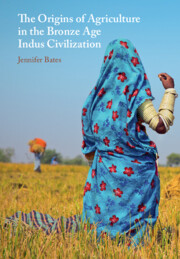
- Publisher:
- Cambridge University Press
- Online publication date:
- December 2024
- Print publication year:
- 2025
- Online ISBN:
- 9781009424424

The Indus civilization in South Asia (c. 320 – 1500BC) was one of the most important Old World Bronze Age cultures. Located at the cross-roads of Asia, in modern Pakistan and India, it encompassed ca. one million square kilometers, making it one the largest and most ecologically, culturally, socially, and economically complex among contemporary civilisations. In this study, Jennifer Bates offers new insights into the Indus civilisation through an archaeobotanical reconstruction of its environment. Exploring the relationship between people and plants, agricultural systems, and the foods that people consumed, she demonstrates how the choices made by the ancient inhabitants were intertwined with several aspects of society, as were their responses to social and climate changes. Bates' book synthesizes the available data on genetics, archaeobotany, and archaeology. It shows how the ancient Indus serves as a case study of a civilization navigating sustainability, resilience and collapse in the face of changing circumstances by adapting its agricultural practices.
 Loading metrics...
Loading metrics...
* Views captured on Cambridge Core between #date#. This data will be updated every 24 hours.
Usage data cannot currently be displayed.